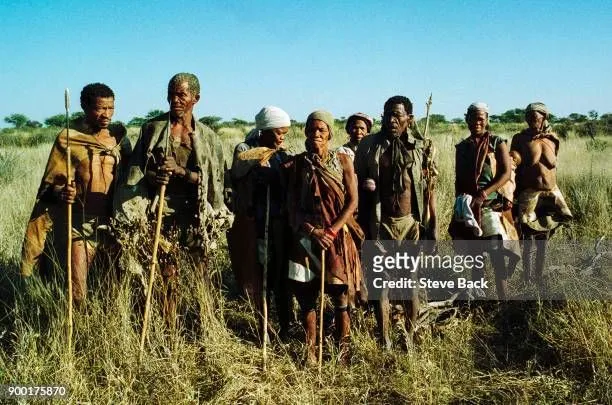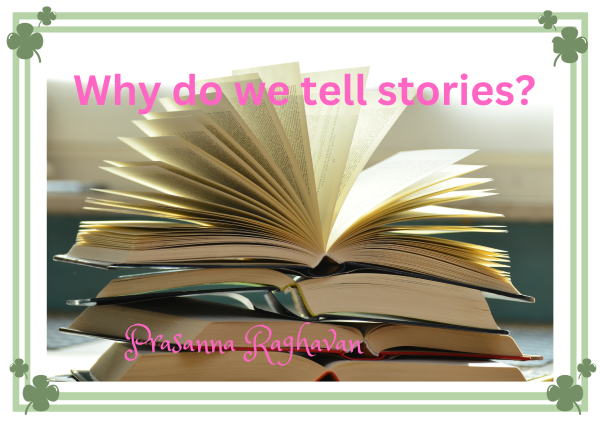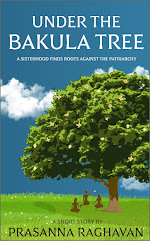Why do We Tell Stories? Hunter-gatherers shed light on it.
This is my first post on the Bookish League challenge. The theme I pursue is -- Why do We Tell Stories? And I am going to write a series of posts on it.
Fiction/stories instruct us on characters' conflicts and how they resolve them. This type of knowledge is meta-knowledge-information about other people's problem-solving. This is important because it could teach us about other people's minds, values, problem-solving and survival. That shared understanding is essential for keeping social values and norms needed for sociality, monitoring, cooperation and survival.
Why do we tell stories?
Last week, our daughters came to visit us when our elder daughter, P, complimented me. "Amma, thank you for taking the pain in introducing me to storybooks at a very young age; why I got the passion for reading books."
During her childhood, we lived in a part of Africa without a public library. We had to set up a library at our home for her. In my childhood, there was no library in my village in Kerala, and I started reading books in my father's library.
What is this in humans about storytelling and introducing children to reading at a young age? All parents do that, but why? Is it simply to get them a grasp of vocabulary for better education and life or something else?
Why do we create fiction and consume it?
I ask this question as a parent, writer, author, and storyteller. I am a physics/maths teacher turned storyteller, curious to learn different aspects of fiction writing. That inspired me to read about the history and the nature of stories and fiction.
The prompt was: when have humans started storytelling? What circumstances have led them to do that? Are there any advantages of spending time in storytelling and reading other than entertaining, time-passing and escaping from the drudgeries of daily life?
In recent years, researchers have been dealing with the topic in numbers. Historians, linguists, anthropologists, neuroscientists, and evolutionary psychologists are among them. Reading their research gave me some answers to my question.
The topic is vast, and I don't claim any expertise in it, but what I grasped gave me enough to be surprised. I have taken fiction, writing, and storytelling as the second nature of our modern lifestyle, advanced in sophistication, literary extravaganza and technology. Instead, storytelling pertains to the adaptations that have evolved in response to characteristically human adaptive problems that have shaped our ancestors' lifestyles as hunter-gatherers more than 200 thousand years ago. As evolutionary psychologists put it, in fiction and story-telling, "our modern skull houses a Stone Age Mind. (Cosmides and Tooby, 1997, 85)"
Who were Hunter-gatherers?
Hunter-gatherers.
 |
| Hunter-gatherers picture credit: Getty Images. |
- Hunter-gatherers were prehistoric nomadic groups on Earth's surface for over two hundred thousand years.
- They lived in Africa and were the early-developed human species closely related to humans. They spread to Asia, Europe, and beyond, with evidence of their activities dating back 200 thousand years ago.
- They earned food through hunting and fishing animals and foraging vegetation in the area where they lived, unlike their predecessors, who scavenged meat killed by others. They invented fire, developed an intricate knowledge of plant life and employed refined technology for hunting for domestic purposes.
- Their culture spanned most of the existence of Home sapiens, dating from the first anatomically modern humans 200 thousand years ago to the agricultural communities (Neolithic age) 12000 years ago. We come to know of them from the traces of their cultural life left behind in tools, settlement, diet and way of life.
- They mark a crucial phase in the development of the human race marked by their inventions, lifestyle, biological and mental development, human cognition and sociality. They invented language, narrative and fiction. Language played a unique role in allowing them to instruct others' imagination and share expressed ideas between the individuals.
 |
| African Campfire Picture credit to #gettyimages |
Storytelling is an adaptive evolution.
Developments offered hunter-gatherers advantages and challenges as they moved into new environments and habitats. Eating cooked food, for example, develops their brain, walk upright, affording time to group together and share stories, resulting in cognitive and mental development. Evolutionary psychologists say their physical and cognitive actions have resulted from adaptive evolution.
Adaptive evolution 'pertains to evolutionary changes in an organism that make it suitable to its habitat."
Problem-solving
Hunter-gatherers lived in social groups. Living in social groups increases the safety of numbers but creates conflicts. When people live in groups, their varied interests result in competition and conflicts. In groups: "Some compete, some ally and some mate."
These are potential grounds for conflicts and necessitate conflict resolution, problem-solving, maintaining social norms and values and how violating cases are resolved. Conflict resolution and problem-solving are a collective process in that the group members should know how others resolve disputes; this instruction sharing based on others' experienced problem-solving has resulted in storytelling.
A recent study shows how hunter-gatherers' improved lifestyle- hunting, foraging, and collective cooking- afforded them time to meet at night in groups and instruct each other on how they solved their social problems and those of others through storytelling.
Language, narrative and fiction.
All species on Earth have developed communication mechanisms, including the apes, but only humans have invented language, narrative and fiction and why?
According to evolutionary theories, "Narrative arose from an adaptive predisposition for sociality, social monitoring, and information sharing in our hominin forebearers that found richer expression after the invention of language."
The hunter-gatherers, we know, lived in social groups. It is considered that the invention of language happened out of the pressure of dependency on one another and to pool more information about others. It swiftly unlocked efficient narrative forms, allowing early humans to learn much more about their kind than they could experience first-hand. But then, the actual narrative was limited to what really happened.
"Once the strong existing predisposition to play combined with existing capabilities for event comprehension, memory, imagination, language and narrative, we could begin to invent fiction and to explore the full range of human possibilities in concentrated engaging, memorable form."
"First language, then narrative, then fiction, created niches that altered selection pressures and made us even more deeply dependent on knowing more about our own kind and our risk and opportunities than we could discover through direct experiences."
"Once fueled by language, narrative impacted our development, our individual and social behaviour, cognition and emotion (our craving nor narrative, for living our lives enriched by detailed knowledge for many other lives), and presumably our genes. It made us more dependent on learning from experiences, not our own."
"Like language, fiction is a collective, piecemeal human invention. Like language and like narrative, it has shaped the niche into which human minds are born and the societies in which they mature to the point where humans almost from birth have story-craving minds."
"Narrative arose from an adaptive predisposition for sociality, social monitoring, and information-sharing in our hominin forebearers that found richer expression after the invention of language."
Conclusion and answer to my initial question.
Hence, the primary purpose of storytelling and fiction is not merely for entertainment, passing time or escaping from the drudgeries of busy lives. They help us survive as a species living in societies that make us deeply dependent on others, knowing more about our own risks and opportunities than we could discover from our first-hand experiences.
And we, as writers and storytellers, are providing materials for these story-craving minds. We instruct them on others' lived experiences and conflict resolution through fiction to take instructions for problem-solving for their own use. And that also cautions us as parents and makes us responsible for what reading and learning materials we provide for our children.
All my readers are storytellers. Please tell me your opinion about how storytelling helps our social life? And what kind of reading materials do we provide our children?










0 comments
Post a Comment